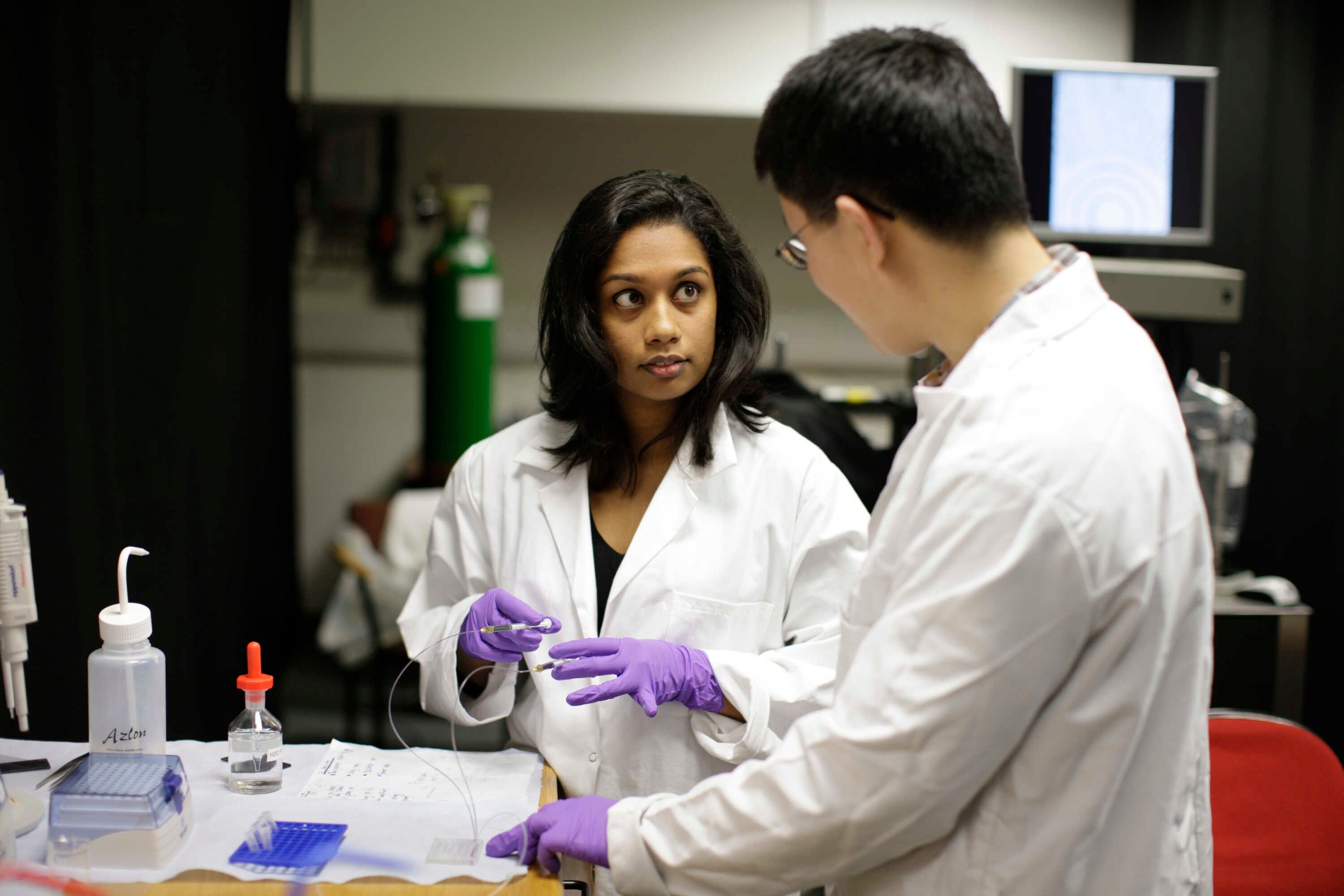
Chemical Biology and Bio-Entrepreneurship
Learn the skills needed to address future scientific challenges in the emerging discipline of chemical biology.
Learn the skills needed to address future scientific challenges in the emerging discipline of chemical biology
Build your understanding of how gene products interact with the molecular and cellular environment
Develop multidisciplinary skills in biomolecular research on an extensive project
Course key facts
-
Qualification
-
MRes
-
-
Duration
1 year
-
Start date
September 2025
-
Study mode
Full-time
-
Fees
£14,900 Home
£41,300 Overseas
-
Delivered by
-
Location
-
White City
-
Minimum entry standard
-
2:1 in chemistry, physics, mathematics, biophysics, biochemistry or bioengineering, with at least 50% physical science content.
Course overview
Advance your understanding of the emerging discipline of chemical biology on this Master's course.
This area of science sits at the interface of traditional chemistry and biology.
You'll draw on ideas of modern physical sciences and apply them to the solution of biological problems at the molecular level.
You'll also explore the techniques being used to address this next great challenge in biological science: how gene products interact with the molecular and cellular environment.
This course will help you build a range of skills in biomolecular research, with teaching carried out in a multidisciplinary environment.
You'll then apply these techniques to an extended research project exploring a set area of chemical biology.
The programme is run by the Institute of Chemical Biology’s Centre for Doctoral Training.
The research element provides physical scientists with the ability to bridge disparate fields and gain the confidence to grapple with biomolecular research in a multidisciplinary environment.
Structure
This page is updated regularly to reflect the latest version of the curriculum. However, this information is subject to change.
Find out more about potential course changes.
Please note: it may not always be possible to take specific combinations of modules due to timetabling conflicts. For confirmation, please check with the relevant department.
You’ll take the following core modules.
Core modules
You’ll design a presentation, which you’ll then deliver using visual tools, in an area of chemical biology.
Assessments that test your understanding and communication of various prototyping methods, and experimental evaluation of the created prototype equipment.
The proposal will assess your aptitude to critically analyse published scientific literature and help you plan towards your final research project.
You’ll also reflect on ethical, safety and commercial/societal considerations within this area of study.
You'll undertake a research project, which incorporates a manuscript, a presentation, and an oral examination
The manuscript will evaluate your skills at presenting, describing and critically discussing your own experimental data.
At the presentation, you'll be expected to present your research with the help of visual tools in a concise fashion, while answering questions directly relevant to your project.
Your oral examination will probe your overall knowledge of the project and the research techniques used, and the potential future direction of the work carried out.
Entry requirements
We consider all applicants on an individual basis, welcoming students from all over the world.
How to apply
Apply online
You can submit one application form per year of entry. You can choose up to two courses.
Application deadlines – Round 1 closes on Thursday 16 January 2025
We operate a staged admissions process with several application rounds throughout the year.
Apply by 23.59 (UK time) on the closing date of an application round, to ensure you receive a response on your application by the relevant decision date.
Application rounds
Round 1
- Applications open on Friday 27 September 2024
- Applications close on Thursday 16 January 2025
- Decision by Thursday 6 March 2025
Round 2
- Applications open on Friday 17 January 2025
- Applications close on Thursday 27 March 2025
- Decision by Thursday 1 May 2025
Round 3
- Applications open on Friday 28 March 2025
- Applications close on Thursday 15 May 2025
- Decision by Thursday 17 July 2025
Round 4
- Applications open on Friday 16 May 2025
- Applications close on Friday 4 July 2025
- Decision by Thursday 31 July 2025
There is no application fee for MRes courses, Postgraduate Certificates, Postgraduate Diplomas, or courses such as PhDs and EngDs.
If you are applying for a taught Master’s course, you will need to pay an application fee before submitting your application.
The fee applies per application and not per course.
- £80 for all taught Master's applications, excluding those to the Imperial College Business School.
- £100 for all MSc applications to the Imperial College Business School.
- £150 for all MBA applications to the Imperial College Business School.
If you are facing financial hardship and are unable to pay the application fee, we encourage you to apply for our application fee waiver.
Find out more about how to apply for a Master's course, including references and personal statements.
Unless you are from an exempt nationality, you will need an ATAS certificate to obtain your visa and study this course.
Nationals from the following countries are exempt: Switzerland, Australia, Canada, Japan, New Zealand, Singapore, South Korea, USA and EEA members.
Use this information when applying for an ATAS certificate to study this course:
- CAH code: CAH07-02-01
- Descriptor: chemistry
- Supervisor name: Professor Oscar Ces
Get guidance and support for obtaining an ATAS certificate.
The description of the MRes course that you should use in your ATAS application is the below:
- Title of the research: MRes in Chemical Biology and Bio-Entrepreneurship
- Description: This is a one year stand-alone multidisciplinary MRes course that equips students with knowledge in the understanding of advances in the biomolecular processes and the development of novel therapeutics. A multidisciplinary approach is taken involving the collaborative efforts of biochemists, chemists and physicists from within Imperial College.
Training is provided by academic and industrial scientists in the chemical biology field. The major focus of the course will be an 8 month multidisciplinary research project, jointly supervised by at least one physical and one life scientist. The taught component of the MRes course will equip students with the foundations necessary to complete their research project within a multidisciplinary environment.
Teaching and assessment
Teaching and learning methods
-
Lectures
-
Tutorials
-
Seminars
-
Practicals
-
Lab work
-
Computational work
-
Workshops
-
Virtual learning environment
Assessment methods
-
Coursework
-
Research project
-
Research proposal
-
Oral presentations
-
Written manuscript
Tuition fees
Home fee
2025 entry
£14,900
You should expect and budget for your fees to increase each year.
Your fee is based on the year you enter the university, not your year of study. This means that if you repeat a year or resume your studies after an interruption, your fees will only increase by the amount linked to inflation.
Find out more about our tuition fees payment terms, including how inflationary increases are applied to your tuition fees in subsequent years of study.
Whether you pay the Home or Overseas fee depends on your fee status. This is assessed based on UK Government legislation and includes things like where you live and your nationality or residency status. Find out how we assess your fee status.
If you're a UK national, or EU national with settled or pre-settled status under the EU Settlement Scheme, you may be able to apply for a Postgraduate Master’s Loan from the UK government, if you meet certain criteria.
For courses starting on or after 1 August 2024, the maximum amount is £12,471.
The loan is not means-tested and you can choose whether to put it towards your tuition fees or living costs.
Overseas fee
2025 entry
£41,300
You should expect and budget for your fees to increase each year.
Your fee is based on the year you enter the university, not your year of study. This means that if you repeat a year or resume your studies after an interruption, your fees will only increase by the amount linked to inflation.
Find out more about our tuition fees payment terms, including how inflationary increases are applied to your tuition fees in subsequent years of study.
Whether you pay the Home or Overseas fee depends on your fee status. This is assessed based on UK Government legislation and includes things like where you live and your nationality or residency status. Find out how we assess your fee status.
If you're a UK national, or EU national with settled or pre-settled status under the EU Settlement Scheme, you may be able to apply for a Postgraduate Master’s Loan from the UK government, if you meet certain criteria.
For courses starting on or after 1 August 2024, the maximum amount is £12,471.
The loan is not means-tested and you can choose whether to put it towards your tuition fees or living costs.
How will studying at Imperial help my career?
Learn what it takes to conduct translational multidisciplinary research to prepare for PhD studies.
The Department of Chemistry has strong sponsorship links for those looking to continue their education.
With specialised knowledge, you'll be highly sought after in a range of sectors.
Become familiar with product development pipelines across a range of industries so you can pursue careers in technological innovation.
Other potential career paths could include roles within the life science, personal care or agri-science industries.
Further links
Contact the department
- Telephone: T: +44 (0)20 7594 2678
- Email: chemres@imperial.ac.uk
Course Directors: Dr Laura Barter and Dr Rudgier Woscholski
View the Department of Chemistry website.

Request info
Find out more about studying at Imperial. Receive updates about life in our community, including event invites and download our latest Study guide.

Events, tasters and talks
Meet us and find out more about studying at Imperial.

Terms and conditions
There are some important pieces of information you should be aware of when applying to Imperial. These include key information about your tuition fees, funding, visas, accommodation and more.
You can find further information about your course, including degree classifications, regulations, progression and awards in the programme specification for your course.
Programme specifications